Điểm nhấn
-
 Hội thảo “Thực trạng người Việt Nam hồi hương từ Vương quốc Anh giai đoạn 2014 - 2023”
Hội thảo “Thực trạng người Việt Nam hồi hương từ Vương quốc Anh giai đoạn 2014 - 2023”
-
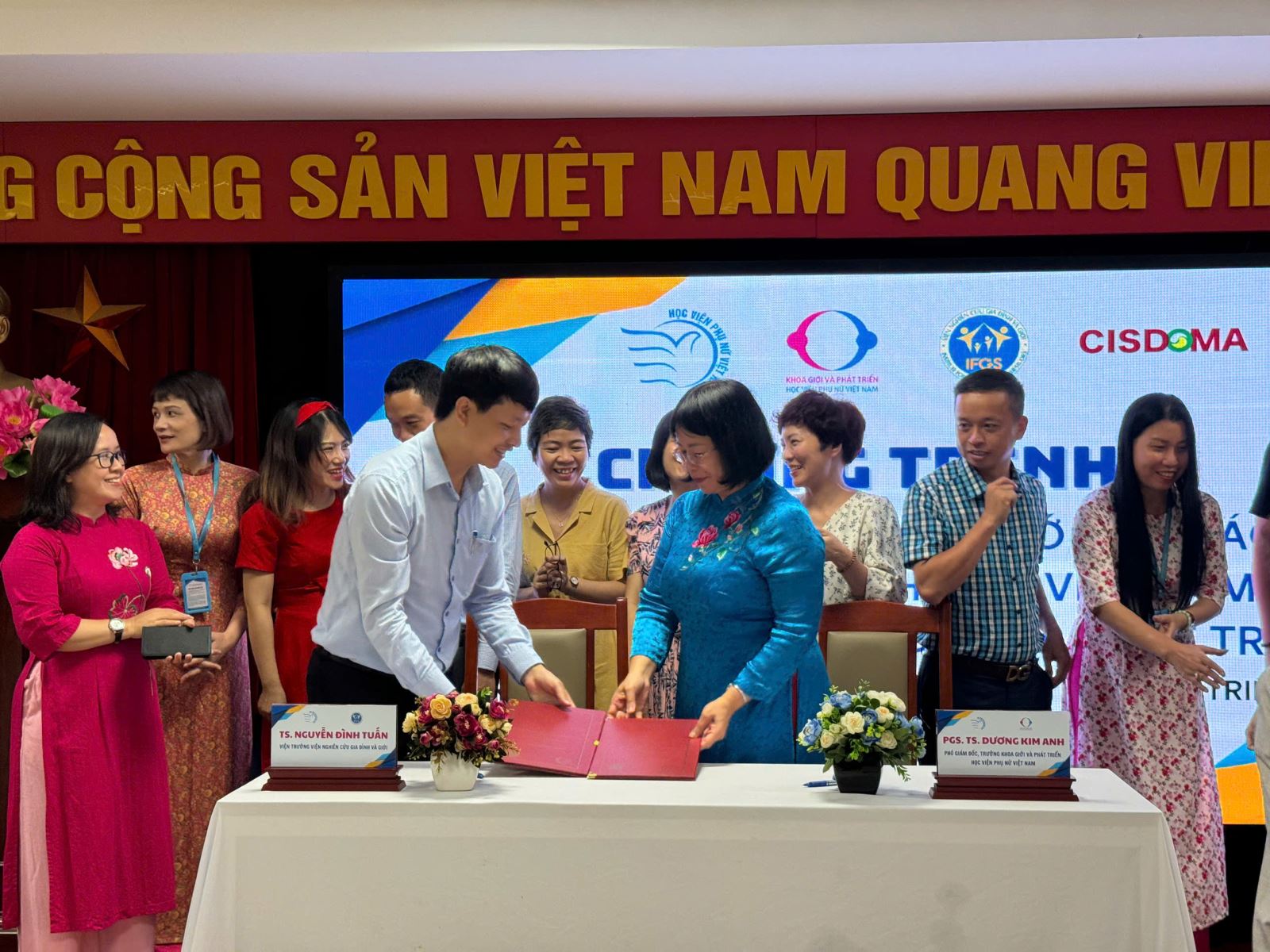 Lễ Ký kết biên bản ghi nhớ hợp tác giữa Học viện Phụ nữ Việt Nam với Viện Nghiên cứu Gia đình và Giới
Lễ Ký kết biên bản ghi nhớ hợp tác giữa Học viện Phụ nữ Việt Nam với Viện Nghiên cứu Gia đình và Giới
-
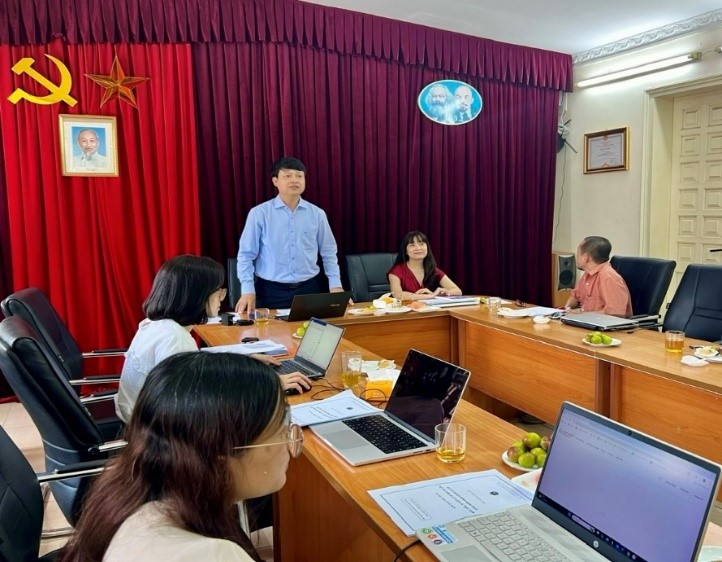 Hội thảo khoa học: "Bộ chỉ số gia đình hạnh phúc: Một số vấn đề lý luận và thực tiễn"
Hội thảo khoa học: "Bộ chỉ số gia đình hạnh phúc: Một số vấn đề lý luận và thực tiễn"
-
 Tọa đàm khoa học "Vận dụng lý thuyết trong nghiên cứu khoa học xã hội"
Tọa đàm khoa học "Vận dụng lý thuyết trong nghiên cứu khoa học xã hội"
-
 Hội nghị Đối thoại giữa Chi ủy, Lãnh đạo viện với đảng viên, viên chức và người lao động Viện nghiên cứu Gia đình và Giới 6 tháng đầu năm 2024
Hội nghị Đối thoại giữa Chi ủy, Lãnh đạo viện với đảng viên, viên chức và người lao động Viện nghiên cứu Gia đình và Giới 6 tháng đầu năm 2024
-
 Chi bộ Viện nghiên cứu Gia đình và Giới tổ chức sinh hoạt chuyên đề: Đoàn kết thống nhất trong Đảng theo tư tưởng Hồ Chí Minh
Chi bộ Viện nghiên cứu Gia đình và Giới tổ chức sinh hoạt chuyên đề: Đoàn kết thống nhất trong Đảng theo tư tưởng Hồ Chí Minh
-
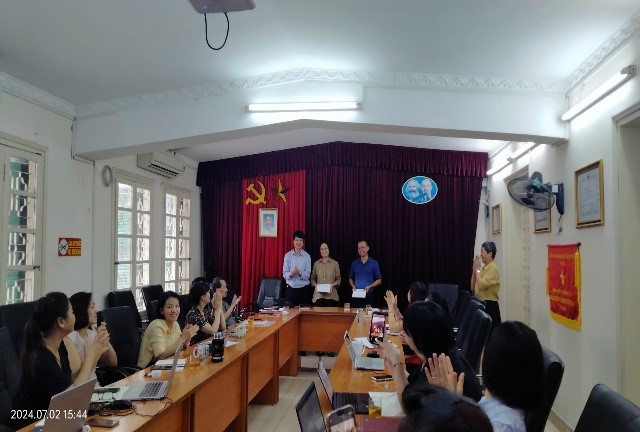 Cuộc thi “Nét đẹp và giá trị gia đình Việt Nam” hưởng ứng Ngày Gia đình Việt Nam 2024
Cuộc thi “Nét đẹp và giá trị gia đình Việt Nam” hưởng ứng Ngày Gia đình Việt Nam 2024
-
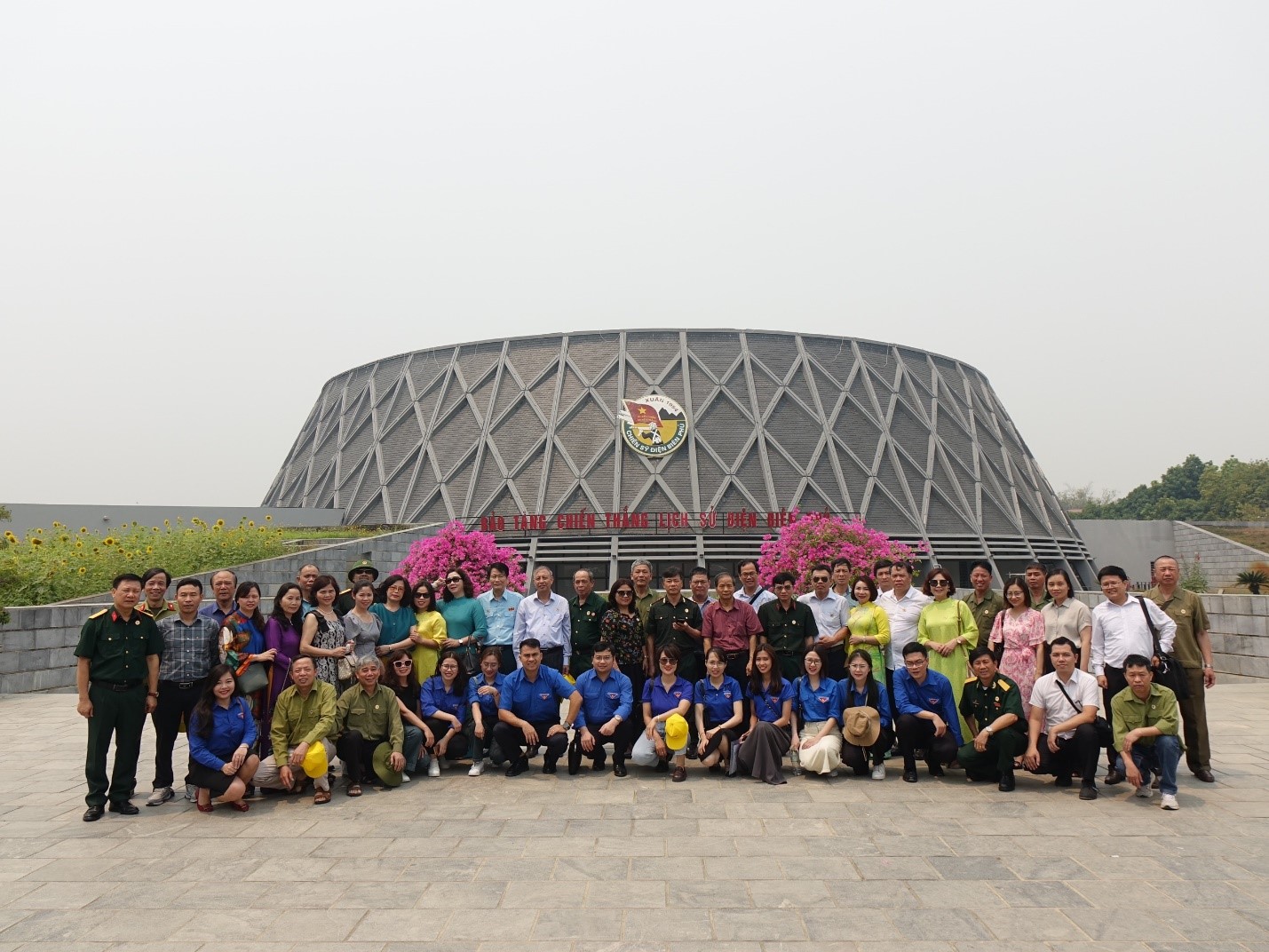 Hội Cựu chiến binh, Đoàn Thanh niên Viện Hàn lâm Khoa học xã hội Việt Nam đi thăm lại chiến trường xưa Điện Biên Phủ
Hội Cựu chiến binh, Đoàn Thanh niên Viện Hàn lâm Khoa học xã hội Việt Nam đi thăm lại chiến trường xưa Điện Biên Phủ
- Tổng mục lục Tạp chí 2023
-
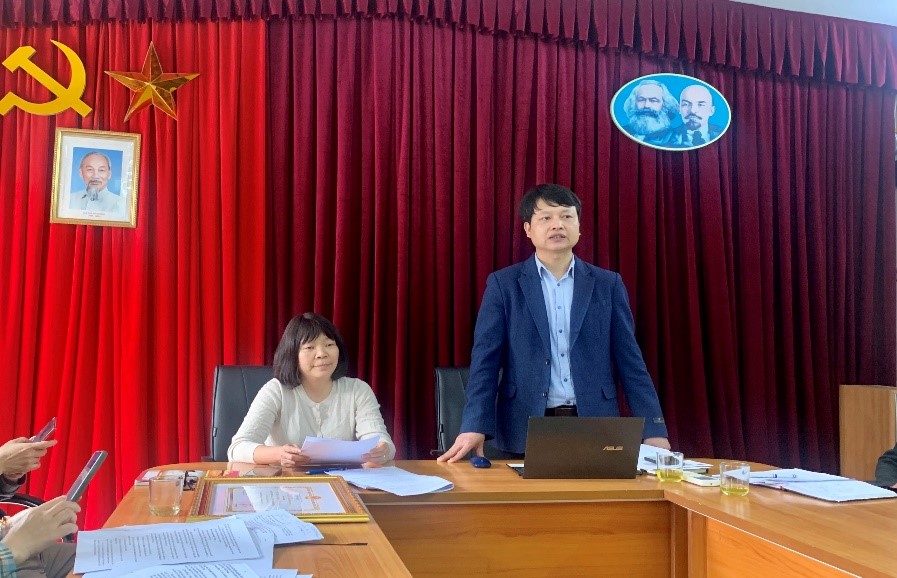 Viện nghiên cứu Gia đình và Giới phát động phong trào thi đua và ký Giao ước thi đua năm 2024
Viện nghiên cứu Gia đình và Giới phát động phong trào thi đua và ký Giao ước thi đua năm 2024
Liên kết web
Số lượt truy cập
78
4743596
Chi tiết tạp chíNo. 1 - 2017
The Institute for Family and Gender Studies, with the first name of the Center for Women’s Studies, was officially established in March 1987 under Decision 95/KHXH-QD of the Chairman of the Vietnam Committee for Social Sciences (now the Vietnam Academy of Social Sciences). This first institution in Vietnam to study women’s issues has marked the birth of a new scientific discipline in Vietnam, which is research on women. With the agreement of the President of the Vietnam Academy of Social Sciences, in the morning of March 25, 2017, in Hanoi, the Institute for Family and Gender Studies (IFGS) solemnly held the 30th anniversary of its establishment (1987-2017) and the receipt of the Third-Class Labour Medal.
Attending the ceremony, on the side of the Vietnam Academy of Social Sciences are: Prof. Dr. Nguyen Quang Thuan, Party Secretary and President of the Academy; Prof. Academician Nguyen Duy Quy - Former Member of the Central Committee of the Party, Former Director of the National Center for Social Sciences and Humanities (formerly known as the Academy); Assoc. Prof. Dr. Bui Nhat Quang, Alternate Member of the Central Committee of the Party, Deputy Secretary of the Party, Vice President of the Academy; Assoc. Prof. Dr. Dang Nguyen Anh, Vice President of the Academy; Assoc. Prof. Dr. Tran Duc Cuong, Former Vice-President of the Vietnam Academy of Social Sciences; representatives of the advisory bodies for the President of the Academy, leaders of specialized institutes and centers attached to the Academy.
On the side of the central agencies and agencies are Mrs. Le Thi Nguyet, Deputy Chairman of the Committee for Social Affairs of the National Assembly; Dr. Tran Tuyet Anh, Director of the Family Department, Ministry of Culture, Sports and Tourism; Mr. Pham Ngoc Tien, Director of Gender Equality Department, Ministry of Labour-Invalids and Social Affairs, representative of the National Committee for the Advancement of Women in Vietnam; Dr. Tran Quang Tien, Director of the Vietnam Women’s Academy; Dr. Do Thanh Ha, Director of the Institute for Public Opinion Research, Central Committee for Propaganda and Education; Ms. Lo Thi Thu Thuy, Deputy Director, National Committee for Religions, Vietnam Women’s Union;
On behalf of the research and training institutions outside the Academy, there are representatives of the Institute of Sociology (Ho Chi Minh National Political Academy); Institute of Labor and Social Science (Ministry of Labor, Invalids and Social Affairs); The Vietnam Sociology Association; Ethnic Institute (Ethnic Committee); Institute of Social Opinion Research (Central Propaganda Department); Institute for Population and Social Studies (National Economics University); Faculty of Sociology (University of Social Sciences and Humanities); Faculty of Sociology (Academy of Journalism and Communication); Department of Family and Social Work (University of Culture); and representatives of the institutes and centers of Vietnam Union of Science and Technology.
On behalf of international delegates, there are representatives of the US Social Science Research Council in Vietnam; UN Women in Viet Nam; Vietnam-Japan University; and other academics, researchers as well as scientists and experts in the field of family and gender research.
On the side of the IFGS were the presence of Prof. Le Thi, the IFGS’s founder and the first leader; and leaders and of staffs of various generations who have been working since the establishment of the Institute.
Addressing at the anniversary, Prof. Nguyen Huu Minh, Director of the IFGS, has summarized the process of establishment, stages of development and research achievements of the Institute. With the efforts over the past 30 years, the Institute was honored to receive the Third-class Labour Medal (2017), the Certificate of Merit of the Prime Minister (2007) and of the Vietnam Academy of Social Sciences (2010, 2011, 2013, 2016).
At the ceremony, authorized by the President of the Socialist Republic of Vietnam, Prof. Nguyen Quang Thuan, Secretary of the Party Committee, President of the Academy awarded the Third-class Labour Medal to the Institute and the Second Class Labor Medal to Prof.Dr. Nguyen Huu Minh for excellent achievements in scientific research and policy consultation to the cause of socialist construction and national defense.
Speaking at the ceremony, President Nguyen Quang Thuan warmly congratulated and affirmed that the noble awards given by the Party and State were the appreciation of the results and contributions of the IFGS in scientific research, policy advice, and training of high quality human resources in the field of family and gender during the past 30 years. The president also emphasized that the Second Class Labour Medal is a very noble reward not only for Prof. Dr. Nguyen Huu Minh but also the joy of all cadres and civil servants of the IFGS. In addition, he raised a number of issues that the Institute should focus on in the coming time to build the Institute to become the leading research institution on family and gender.
On this occasion, the Institute also received many bouquets of flowers and congratulatory messages from the Party, State, relevant Ministries and Departments and the Academy.
At the end of the ceremony, Prof. Dr. Nguyen Huu Minh would like to thank the congratulations and appraisals of the delegates and distinguished guests for the achievements the Institute has achieved during 30 years of formation and development. It is an important baseline for the Institute staff to review obstacles and share archievements. These have created a solid foundation for the IFGS to make continuous contributions to family and gender research as well as gender equality in the family and the whole society.
Training Seminar: Methodological Issues of Care in Cross-country Research
As part of the international cooperation Project of “Care in Modern Family: Perspectives of Older and Younger Generations in two Major Cities in Vietnam and the UK” funded by British Academy Newton Mobility Grants, on 15-16 May 2017 in Hanoi, Institute for Family and Gender Studies (IFGS) organised a training seminar: “Methodological Issues of Care in Cross-Country Research.”
The training seminar, which is one of the foci of the Project, aims at enhancing knowledge and building capacity for early-career researchers in Vietnam regarding methodological issues of care from the intergenerational and cultural comparative perspectives, issues of research ethics in social sciences in general and social work in particular, and sharing research experiences on care from comparative perspectives.
Early-career researchers of Institute for Family and Gender Studies and Institute of Sociology, affiliated to Vietnam Academy of Social Sciences, attended the training seminar. In opening speech at the seminar Prof. Dr. Nguyen Huu Minh, Director of the IFGS, emphasized that the main objectives of this training seminar are capacity building and skills development for early-career researchers to conduct international research and enrich knowledge of professional provision of social and health care. He encouraged participants to actively engage in discussion, exchanges, raising questions and comments with the trainers from Department of Social Care and Social Work, Faculty of Health, Psychology and Social Care of Manchester Metropolitan University, UK. By doing so, participants can learn from each other’s experiences and understanding and improve their knowledge.
At the training seminar, participants were provided the methodological issues of care such as participatory research skills, limitations and drivers of involving service users in research, ethical issues, code of conduct and research governance for social work and social care from lecturers of Prof. Hugh McLaughlin and Dr. Jo-Pei Tan, Manchester Metropolitan University, UK.
From the perspectives of Vietnamese culture, IFGS researchers shared their experience and research context of elderly care in ageing society of Vietnam from perspectives of policy and structure (Dr. Tran Thi Minh Thi); methodology and significance of the measurement of economic values of unpaid work (including care work) in Vietnamese households (Dr. Tran Thi Hong); the model of elderly care of nursing homes in Hanoi (MA. Nguyen Ha Dong).
The methods of the training seminar are to create forum for trainees and trainers between Vietnam and UK sharing and learning from each other their knowledge and skills through discussion and engagement. The similarities and differences of social care and social work in terms of concepts, scopes, definition, practices, methods and policy system between a developed country like UK and a developing country like Vietnam are actively discussed by participants.
At the closing ceremony, Dr. Tran Thi Minh Thi, Deputy Director of IFGS highlighted the importance of the participatory method of this training seminar which is based on the knowledge sharing and mutual learning through discussion and engagement between Vietnamese early-career researchers and international researchers. In the context of limited human resources and budget for intensive capacity building activities, this kind of training seminar is a good opportunity for early-career researchers of IFGS as well as other related institutions.
Improving Antenatal Care for Vulnerable Women in Vietnam
Abstract: This paper examines change in practice for antenatal care and the impact of donor supported maternal and child interventions in the three surveyed provinces in Vietnam. A total of about 2,573 cases of mothers aged 15-49 who gave birth from 2003-2014 were analyzed. Multivariate regressions were done to determine which independent variables are associated with maternal care practices. Findings show that in general percentage of antenatal care behaviors of women in surveyed communes is increased after 5 years. Intervention impacts are clearer for women with higher education. Mother’s education, occupation, living standard and year of birth have significant effect: more antenatal care for recent birth; higher education mother; saler and officers vs. farmers; Kinh women vs. ethnic minority; higher living standard. To improve antenatal care for Vietnamese mothers, especially for vulnerable ones, it is recommended that: provision of intervention medical projects for women in rural areas regarding safe motherhood should be continued; awareness of safe motherhood for women, especially for ethnic minority group, lower education and in poor households should be improved; living standard and education for women should be improved.
Gender Ideology and Practices in Marital Infidelity in Contemporary Vietnam
Abstract: The paper investigates gender attitudes towards marriage with a case study on marital infidelity in contemporary Vietnam through a new research channel, social media. Given the fact that social networking sites and online fora are flourishing in this country, Vietnamese men and women have actively participated in those platforms for different purposes, including seeking new knowledge, making friends and connecting with the people who have similar concerns and hobbies, and sharing private issues which cannot be confided in anyone in real life. The Revelation section on Marriage and Family of Webtretho (www.webtretho.com), the largest online forum for women in Vietnam, was observed. In addition, 12 male and female active members of that forum were also selected for in-depth interviews. The findings of the study indicate that although there have been several changes related to men’s selection criteria for marital partners, Vietnamese people’s gender beliefs in marital infidelity are still highly conservative. Vietnamese women have low agency in making decisions concerning their marital lives, which is proved by their efforts to sustain their families despite their husbands’ sexual infidelities. Meanwhile, Vietnamese men have greater autonomy in terms of sexuality but do not accept the same degree of liberty and autonomy on the part of women.
Marxist’s Theory on Family and Women Equality and Implications to Transitional Vietnam
Abstract: The article thorouhgly reviews a Marx and Engels’ ground-breaking work on the history of the family, namely “The Origins of the Family, Private Property and the State”. In this important work, and basic reference point in Marxist feminism, Engels and Marx not only showed connections between patriarchy and private property but also held that the key to women’s liberation laid in wage labour, which would in itself bring family equality. In Vietnam, it could be seen that during the socialist era, the Vietnamese government has issued a series of laws and policies in relation to marriage and the family. Although these efforts haven’t been able to bring in a full liberation for Vietnamese women from gender oppression, they have somewhat contributed in promoting gender equality and raising the status of women in the society.
Abstract: Viet Nam has made tremendous efforts to harmonize its national laws, policies and practices on juvenile justice in line with the United Nations Convention on the Rights of the Child (CRC) that it ratified in 1990 as the first country in Asia and the second in the world. Furthermore, awareness raising, training and capacity building programmes have been undertaken with law enforcement and judicial bodies as well as other stakeholders. However, much remains to be done. More reforms, greater knowledge and understanding are critical to developing appropriate interventions for prevention, protection and reintegration of children who are at risk or in conflict with the law. It is also essential for the development and promotion of alternative measures to the institutionalization of children in the legal and judicial systems. Finally, urgent recommendations are made to key stakeholders for further protection and promotion of the rights of children in conflict with the law.

